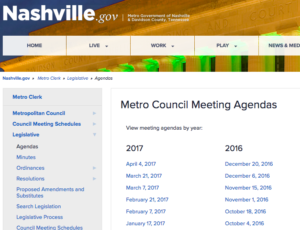5 things to watch in public records policies
To influence government, citizens must have access to information.
In Tennessee, an important safeguard to that access is the state’s public records law.
But sometimes that law gets ignored or flouted, and government entities create rules or habits that make it hard, confusing or downright impossible for citizens to access public records in a timely way.
Last year, lawmakers took a step in the right direction toward encouraging compliance with the Tennessee Public Records Act, and passed a law that requires every government entity in the state to establish a public records policy by July 1.
The public records policies must outline the process for citizens to make public records requests — including key information such as where to send requests — and include information on how the government will respond. Importantly, the law says that the process cannot be more burdensome on citizens than allowed under the law.
The state’s Office of Open Records Counsel developed a model policy as a guide, along with Best Practices. It has many solid recommendations on complying with the laws, but also left room for some options.
Based on TCOG’s work with public records requesters, I’ve focused on five issues to watch as city councils, boards of aldermen, county commissions, industrial development boards, state agency boards and others move to adopt new policies.
1 – Does the policy contain a fee-waiver provision for records in the “public Interest” or “public good”?
One of the biggest obstacles to getting copies of public records is paying for them. The law allows citizens to inspect public records for free, but if they want copies, the state permits “reasonable charges.”

If a government entity charges labor fees for copies, it should include a fee-waiver provision for records of public interest to promote transparency and access. Photo by Nick Youngson, CC BY-SA 3.0
In Tennessee, the largest part of such charges is not the cost of paper and ink, but labor fees based on how long the government determines it takes a government worker to fulfill the request, and the salary level of that person.
This is no small matter. In the past few months alone, news organizations in Bristol and Chattanooga were pursuing local stories related to high-profile government problems and were given estimates of $4,785 and $2,525 respectively to get copies of records that would shed additional light.
The Bristol news reporter was granted a fee waiver; not so in Chattanooga where the records still have not become public.
The key is this: The law does not require government entities to charge anything for public records. In fact, many citizens feel like the cost of a government worker’s time in compiling records is already paid for with taxpayer dollars.
If governments are going to charge labor fees for preparing copies, a waiver policy should be included when the records are for non-commercial purposes and are of public interest. This recognizes that providing information to citizens is a vital part of government’s responsibilities in a democracy.
2 – Use of personal devices to take pictures of public records.
Allowing citizens to take pictures of public records is related to a fee-waiver provision because both deal with the prohibitive cost of copies when a government has unchecked authority to set the price.
Sometimes, because of high cost calculations of labor, a requester’s only real choice is to “inspect” a public record and forego copies. Free inspection is an important safety net in our law. (Citizens withstood an effort two years ago by some government entities trying to get rid of it.)
In the old days, someone inspecting records might take a pen and pad of paper to a government office and copy down word-for-word relevant portions of records as part of their note-taking.
But cell phones with cameras have transformed note-taking. Now with a quick click, a requester can store accurate information on their phone — no ink, paper or scribbled handwriting required.
It’s fast and efficient, and promotes accuracy. No one has to sit with the requester for hours while he or she transfers information into a notepad. No one has to wrestle with a copy machine. No paper is wasted.
What’s more, the public records law says that “Where any person has the right to inspect public records, such person shall have the right to take extracts or make copies thereof, and to make photographs or photostats of the same…”
However some government entities have started including in policies, with no explanation, a ban on photographing public records. The only explanation I’ve heard is that some records are so fragile that allowing a citizen to handle them could cause damage. Surely, this is rare.
More likely, government entities have no reasonable reason for prohibiting photos of public records, but do so because they want to force a requester to ask for copies, triggering the ability to collect labor fees.
Prohibiting photographs is the wrong answer to the wrong problem. Using photography as a way to record notes about information in public records should be perfectly acceptable in every government entity.
3 – Does the policy commit the government entity to put regularly requested public records on its website?
Some public records are so frequently requested that the government entity should publicly disclose them through its website or some other way that makes them available online.

If a government entity has a website, it should post meeting agendas, board packets, draft minutes and minutes online. Here’s an example of Nashville’s website.
I’m talking about meeting agendas, board packets that contain documents related to the agenda, draft minutes of meetings and final approved minutes of meetings.
Some government entities already post some of these records to their website, and some post them in a timely way. But many do not, or do not post them in a timely way.
Draft minutes are of particular concern. Sometimes a government entity will refuse to provide a copy of draft minutes because a governing body has not yet approved them. But that can leave a citizen in the dark when approval of minutes doesn’t take place until the governing body’s next meeting, often a month away. Draft minutes are a public record, open for inspection under the law, and should be posted and labeled as draft until final minutes are approved. They often are the only record of what happened at the meeting and should be made available immediately.
Likewise, in addition to the agenda, the board packet that contains the explaining documents about what is to be voted on in a public meeting should be readily available online. Too often, agendas are so vague that a citizen would have no idea what the item meant. The board packet provides explanation.
4 – Does the policy make clear that the government entity will follow the law and provide records promptly?
The Best Practices and Guidelines developed by the Office of Open Records Counsel says this about the state law’s requirement that public records must be provided promptly:

Government entities should commit to providing records promptly, and not default to unnecessary delays. Photo by Tom Woodward, CC BY-SA 2.0
“Governmental entities should ensure open public records responsive to a TPRA (Tennessee Public Records Act) request are provided promptly. It is not considered ‘prompt,’ under the TPRA, to routinely wait seven (7) business days to respond to a record request.”
The seven days is a reference to a requirement in the law that a government entity must respond to a records request no later than seven business days when it is not practicable to respond promptly. But too often, government entities ignore the “prompt” language and default to seven business days as a way to delay answering a public records request.
This is especially pernicious when the intent is to delay citizens from getting information that is relevant to an upcoming meeting until after an issue has been voted upon.
5 – Does the policy list the the name and email address to which a public records request can be sent?
Making it easier to access public records will go a long way in promoting informed citizens who are better equipped to participate in their government, whether at the local or state level.
Polices should include the name of the public records request coordinator and the email address, mailing address and phone number where inquiries can be made.
From the perspective of the citizen, the hardest step is often how to request a public records. Government needs to make this process easier.
Lawmakers followed up on last year’s work this year with legislation that further specifies that government entities that use email in government business must accept public records requests by email, as well as by U.S. Postal Service. This legislation, as of today, has been passed by the House and Senate, but has not yet become law.
Irregardless of the legislation’s outcome, it’s important to check that policies being developed across the state include email addresses to make it easier to reach the public records request coordinator.
Deborah Fisher is executive director of Tennessee Coalition for Open Government and can be reached at [email protected] or through the website at www.tcog.info.



